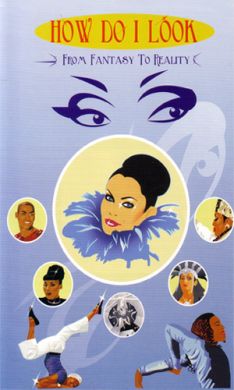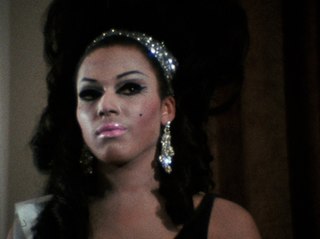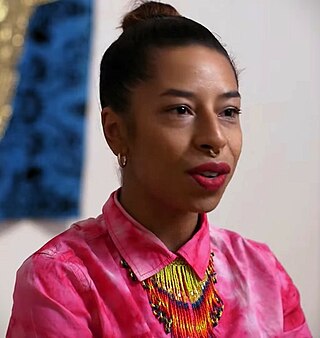Related Research Articles
Drag is a performance of exaggerated femininity, masculinity, or other forms of gender expression, usually for entertainment purposes. Drag usually involves cross-dressing. A drag queen is someone who performs femininely and a drag king is someone who performs masculinely. Performances often involve comedy, social satire, and at times political commentary. The term may be used as a noun as in the expression in drag or as an adjective as in drag show.

Vogue, or voguing, is a highly stylized, modern house dance originating in the late 1980s that evolved out of the Harlem ballroom scene of the 1960s. It is inspired by the poses of models in fashion magazines.

The Tribeca Festival is an annual film festival organized by Tribeca Productions. It takes place each spring in New York City, showcasing a diverse selection of film, episodic, talks, music, games, art, and immersive programming. The festival was founded by Robert De Niro, Jane Rosenthal, and Craig Hatkoff in 2002 to spur the economic and cultural revitalization of Lower Manhattan following the September 11, 2001, attacks on the World Trade Center. Until 2020, the festival was known as the Tribeca Film Festival.

Paris Is Burning is a 1990 American documentary film directed by Jennie Livingston. Filmed in the mid-to-late 1980s, it chronicles the ball culture of New York City and the African-American, Latino, gay, and transgender communities involved in it.

William Roscoe Leake, better known as Willi Ninja, was an American dancer and choreographer known for his appearance in the documentary film Paris Is Burning.

The Ballroom scene is an African-American and Latino underground LGBTQ+ subculture. Its origins can be found in drag balls of the mid-19th century United States, such as those hosted by William Dorsey Swann, a formerly enslaved Black man in Washington D.C.. By the early 20th century, integrated drag balls were popular in cities such as New York, Chicago, New Orleans, Baltimore, and Philadelphia. In the mid-20th century, as a response to racism in integrated drag spaces, the balls evolved into house ballroom, where Black and Latino attendees could "walk" in a variety of categories for trophies and cash prizes. Most participants in ballroom belong to groups known as "houses", where chosen families of friends form relationships and communities separate from their families of origin, from which they may be estranged. The influence of ballroom culture can be seen in dance, language, music, and popular culture, and the community still exists today.

Pepper LaBeija was an American drag queen and fashion designer. She was known as "the last remaining queen of the Harlem drag balls".

How Do I Look is a 2006 American documentary directed by Wolfgang Busch. The film chronicles ball culture in Harlem and Philadelphia over a ten-year period.

Léa Hélène Seydoux-Fornier de Clausonne is a French actress. Prolific in both French cinema and Hollywood, she has received various accolades including five César Award nominations, two Lumières Awards, a BAFTA Award nomination, and the Trophée Chopard Award. In 2016, Seydoux was honoured with the Chevalier of the Order of Arts and Letters. In 2022, the French government made her a Knight of the Legion of Honour.
Founded in 1982, the House of Xtravaganza is one of the most publicly recognized "houses" to emerge from the New York City underground ballroom scene and among the longest continuously active. House of Xtravaganza members and the collective group is recognized for their cultural influence in the areas of dance, music, visual arts, nightlife, fashion, and community activism. House of Xtravaganza members continue to be featured in popular media and travel the world as ambassadors of voguing and the ballroom scene.
"Kiki", a term which started in ballroom culture, was later made more famous in the 2012 song "Let's Have a Kiki" by the Scissor Sisters, and has recently been brought back to slang by the LGBT community, is loosely defined as a gathering of friends for the purpose of gossiping and chit-chat.

Paris Dupree was an American drag performer and documentary participant featured in Jennie Livingston's 1990 documentary, Paris is Burning, which was named after Dupree's annual ball.

The Queen is a 1968 American documentary film directed by Frank Simon and narrated by Flawless Sabrina. It depicts the experiences of the drag queens organizing and participating in the 1967 Miss All-America Camp Beauty Contest held at New York City's Town Hall. The film was screened at the International Critics' Week section of the 1968 Cannes Film Festival; however, the festival was ultimately curtailed and ended due to ongoing civil unrest in France before any awards could be given out.
The House of Aviance is one of the "legendary/iconic" and major vogue-ball houses in the United States, with its base in New York City. It was founded in Washington, D.C., in 1989 by voguer/dancer, record label owner (CEO/A&R), nightclub host, music artist and secretary Mother Juan Aviance—one of the nightlife personalities of New York City. Since its founding, the House has played an integral part in U.S. and world ball culture, especially U.S. nightlife.
Mother Juan Aviance is an American secretary, voguer / dancer, music artist, nightclub host / promoter, record label owner, and CEO / A&R. He is the founder and "Mother" of the House of Aviance, one of the legendary houses that emerged from the U.S. ball culture in the 1980s, a House which is still active in New York City." He is also founder, CEO and A&R of Aviance Records, LLC, a multi-genre record label that promotes new and upcoming artists. He is regarded within the ballroom scene and is "House Mother" to the nightlife personalities and recording artists Kevin Aviance, and Erickatoure Aviance.

Venus Nadya Oshun, known professionally as Aja Miyake-Mugler or better mononymously as Aja, is an American rapper, reality television personality and drag queen best known for competing on the ninth season of RuPaul's Drag Race and on the third season of RuPaul's Drag Race All Stars.

Crystal LaBeija was an American drag queen and trans woman who co-founded the House of LaBeija in 1968. The House is often credited as starting the house system in ball culture. She became a mother figure for homeless LGBTQ youth.

Kia Michelle Benbow is an American fine artist. Her most well known series, 24, is a sociopolitical commentary on the effects of growing up as a young woman of color with HIV. She is a former Mother of the Royal House of LaBeija.

My House is a documentary/reality series focusing on ball culture in New York City. It follows Tati 007, Alex Mugler, Jelani Mizrahi, Lolita Balenciaga, Relish Milan and the commentator Precious Ebony. The first of ten episodes premiered on Viceland on April 25, 2018.
References
- ↑ Lawrence, Tim (2011). Listen, and You Will Hear all the Houses that Walked There Before: A History of Drag Balls, Houses and the Culture of Voguing. London: Soul Jazz. Archived from the original on August 26, 2018.
- ↑ Iovannone, Jeffry J. (Jun 29, 2018). "Crystal LaBeija: Legendary House Mother". Medium. Archived from the original on June 30, 2018. Retrieved Jan 12, 2019.
- ↑ Street, Mikelle (August 19, 2016). "The Iconic Drag Queen Behind Frank Ocean's 'Endless'". Vice. Archived from the original on June 14, 2018. Retrieved January 23, 2019.
- ↑ Jones Chanel, Isla (March 26, 2015). "A GIF Guide to Voguing (+ Short History)". Standard Culture. Archived from the original on June 12, 2018.
- ↑ "The House of LaBeija | 2022 Tribeca Festival".
- ↑ "Here are all of the LGBTQ+ films at the 2022 Tribeca Festival!". 20 April 2022.
- ↑ "Tribeca Festival Lineup Includes 'Corner Office' with Jon Hamm, Ray Romano's 'Somewhere in Queens', More". 19 April 2022.